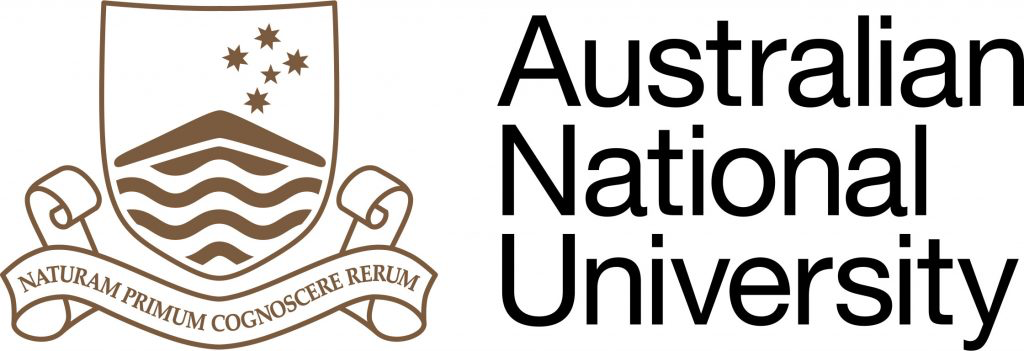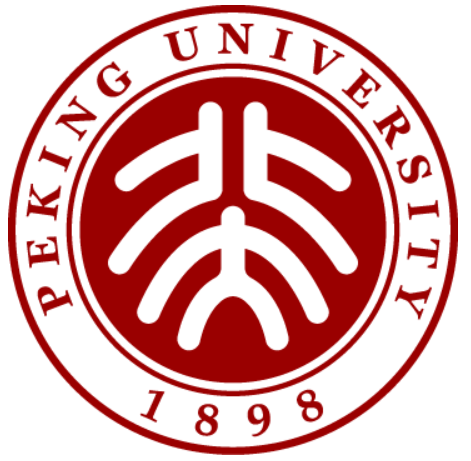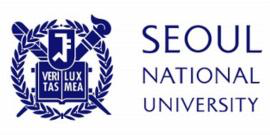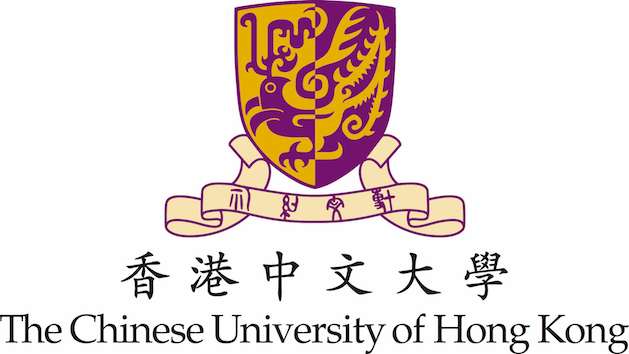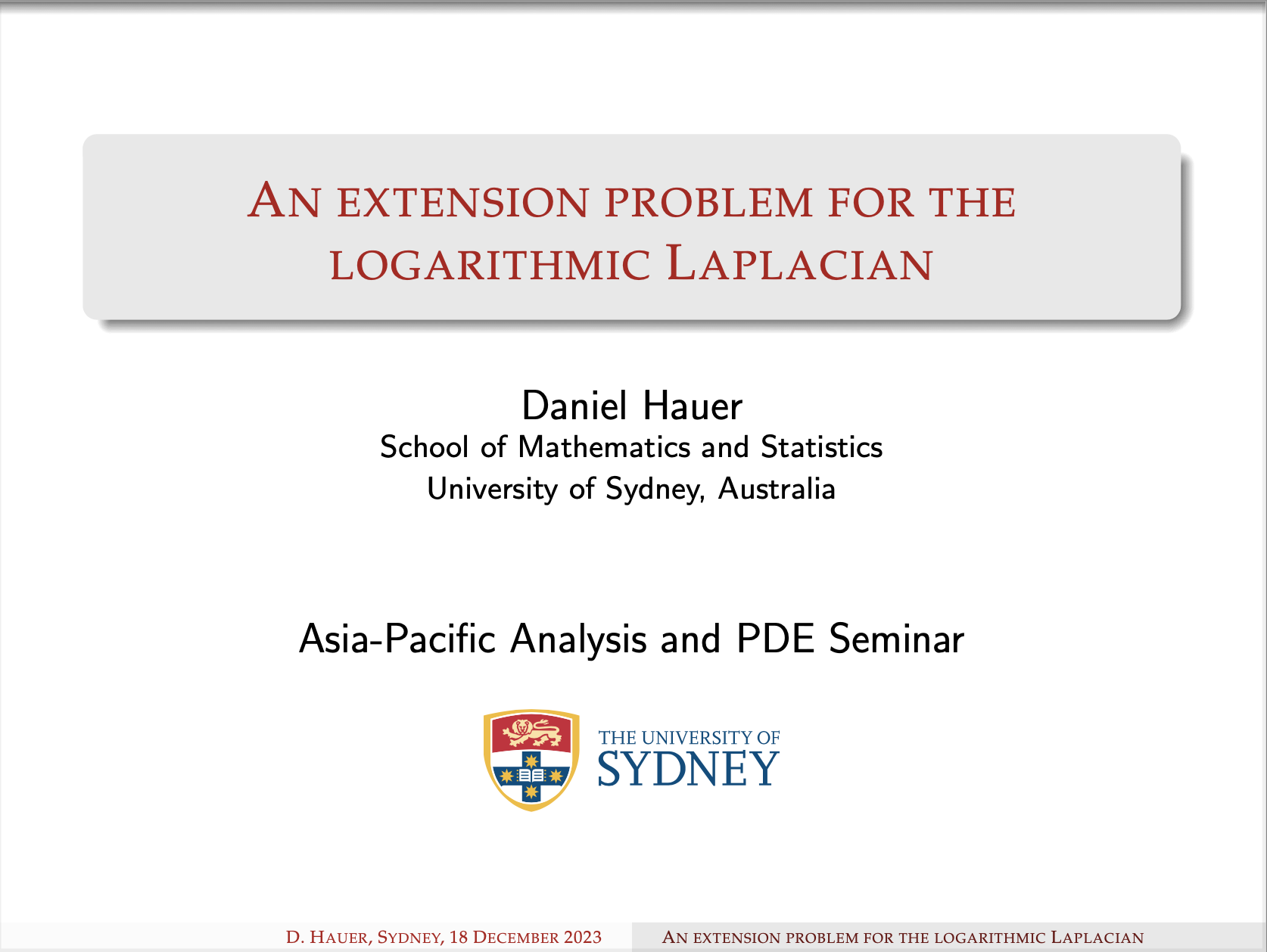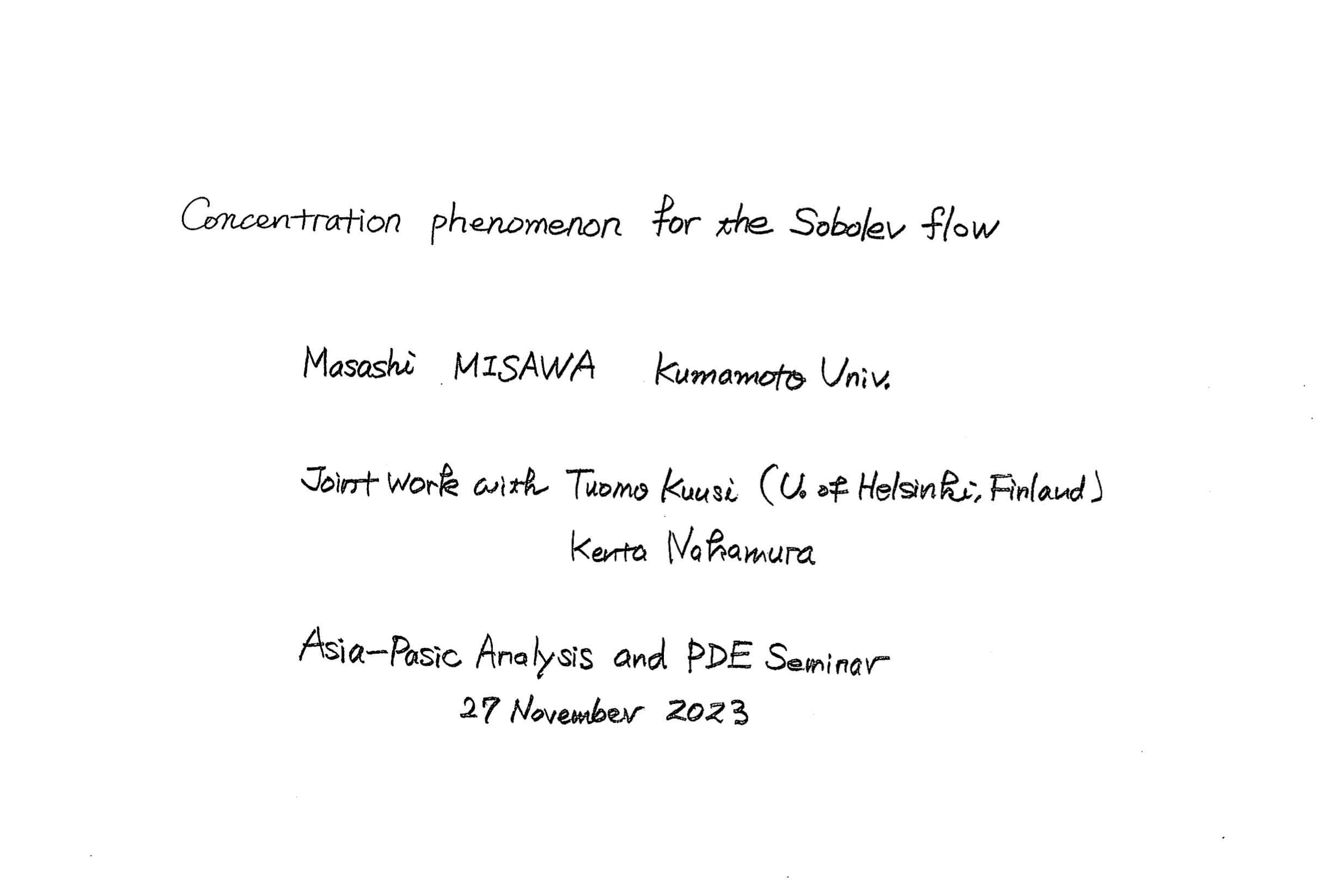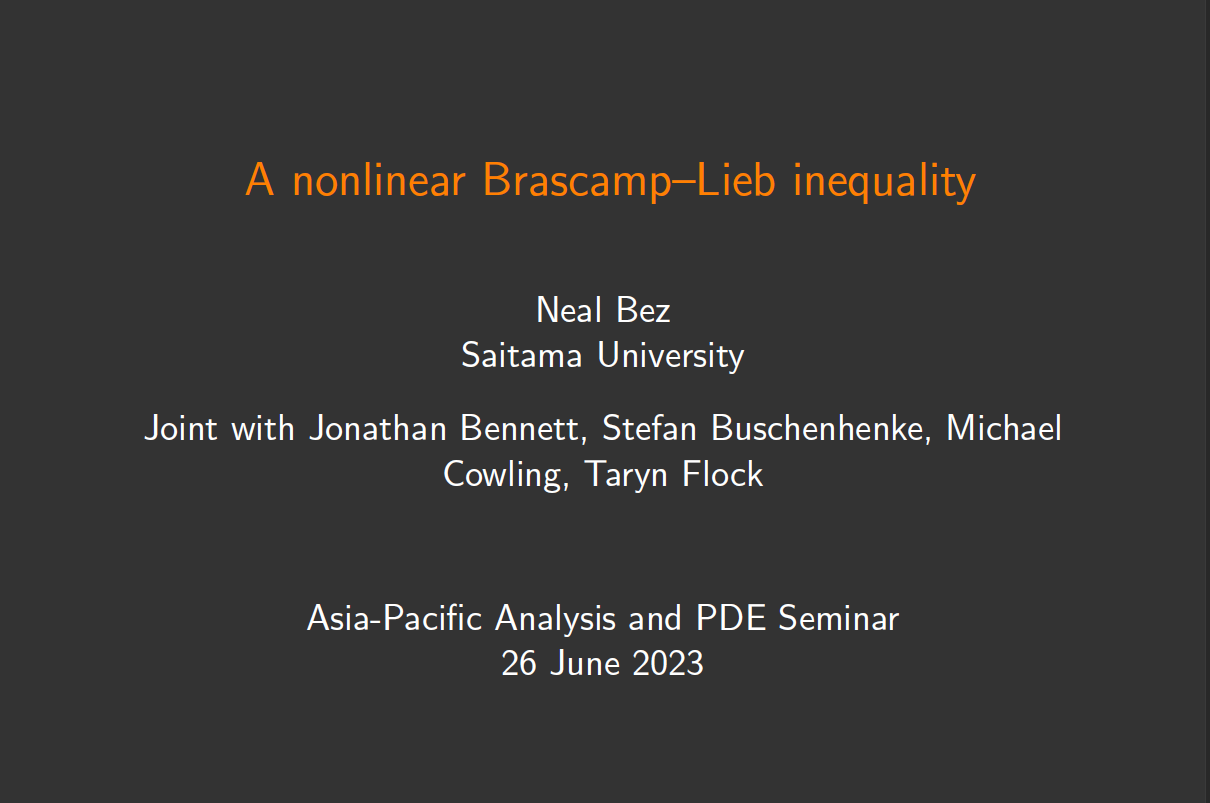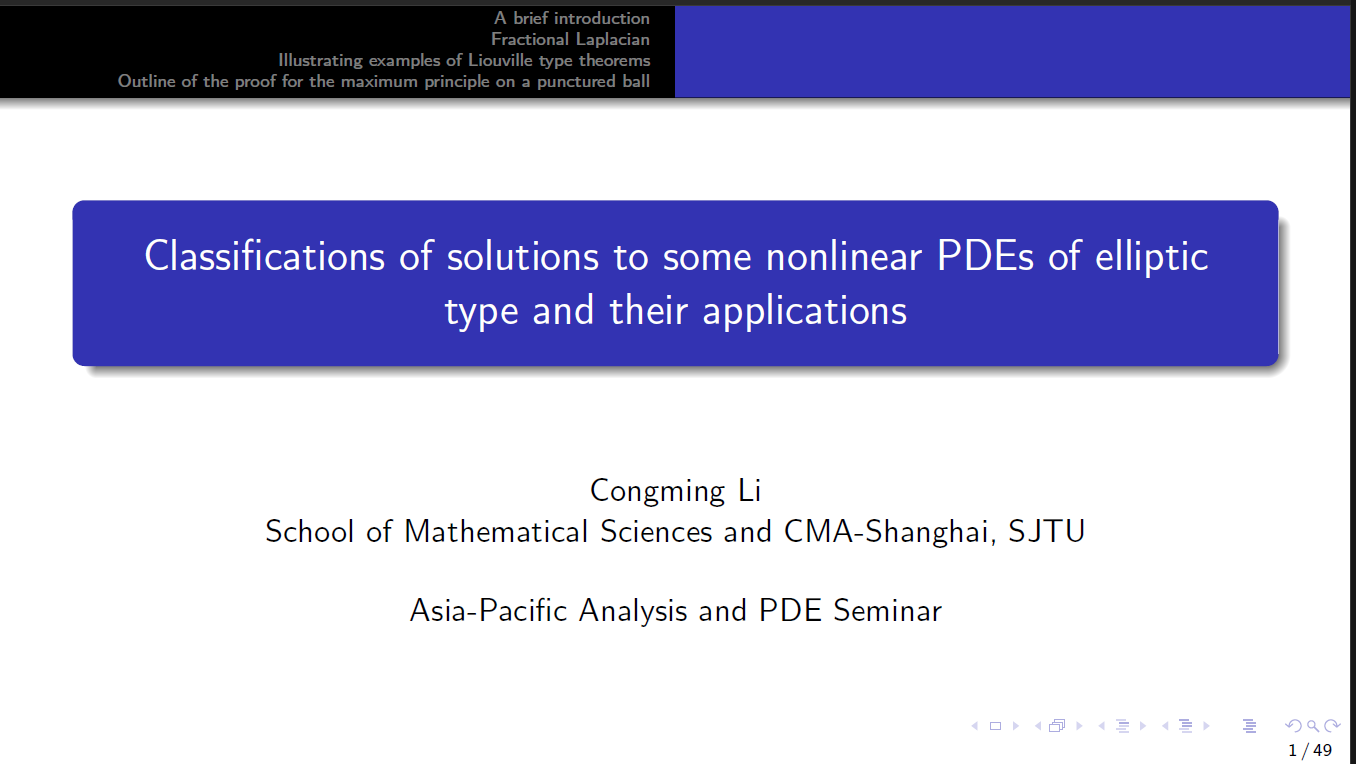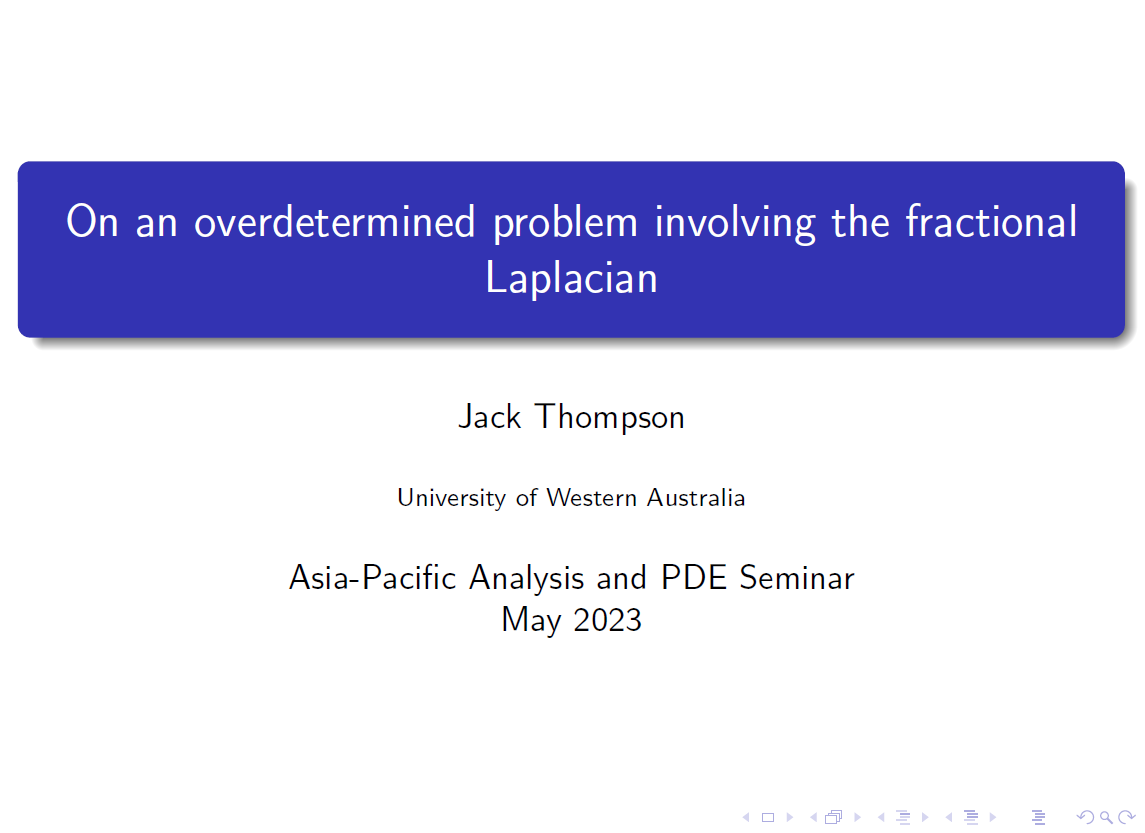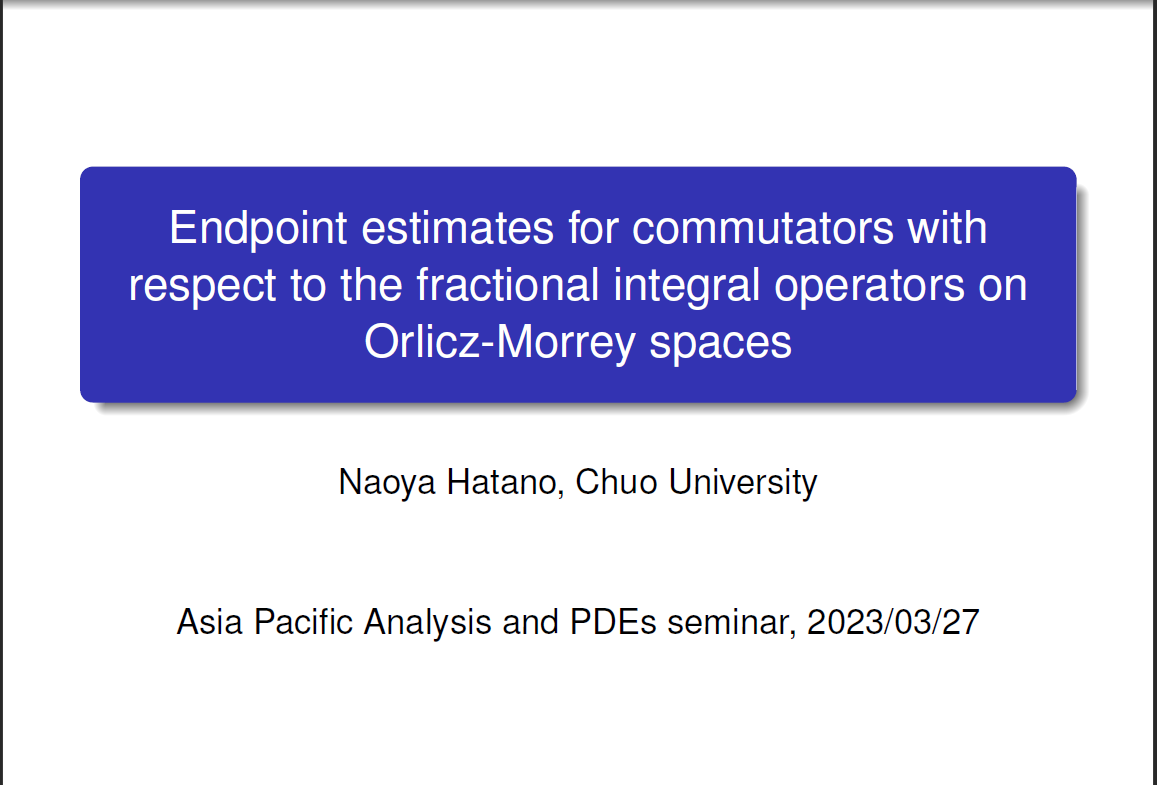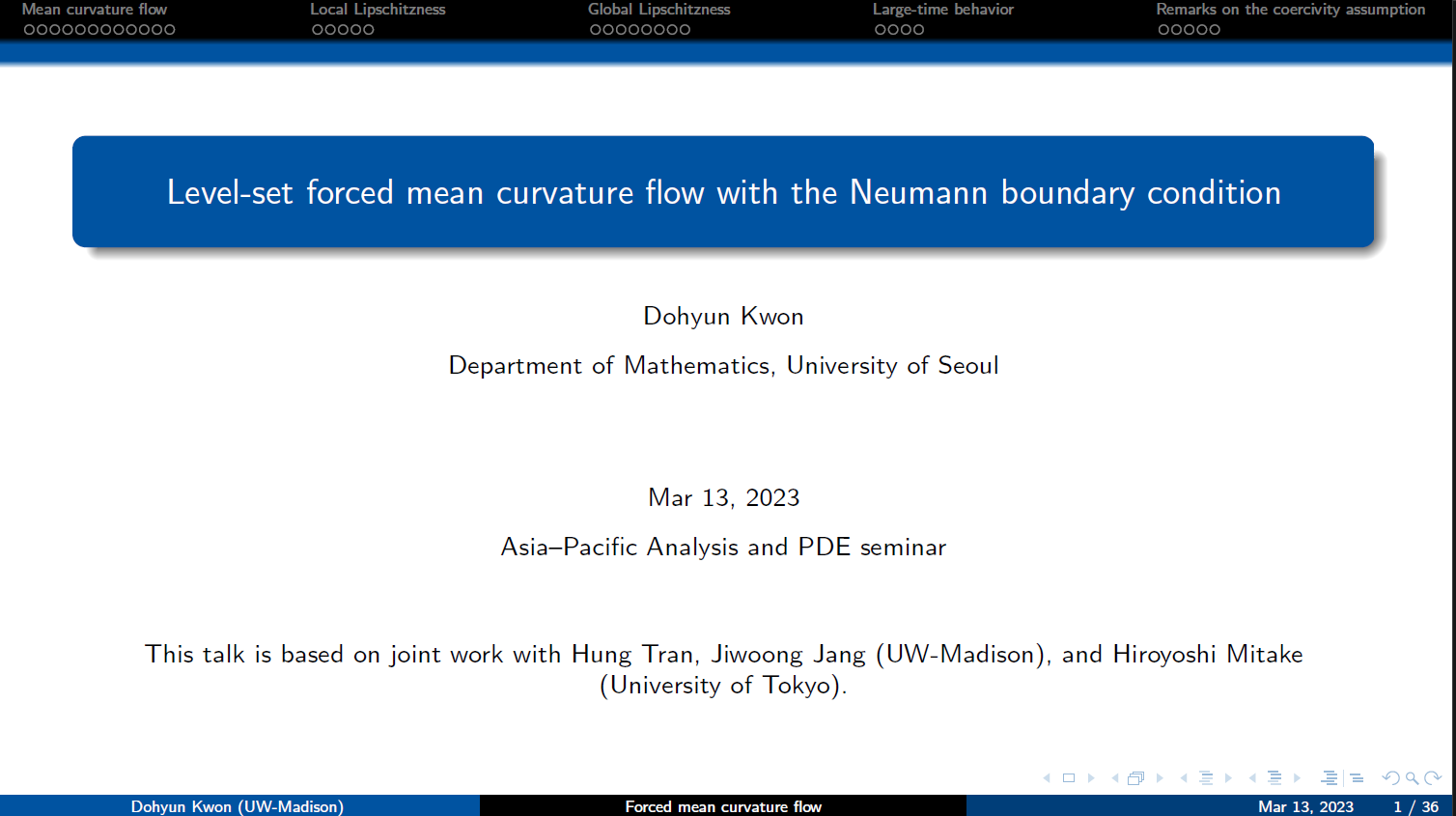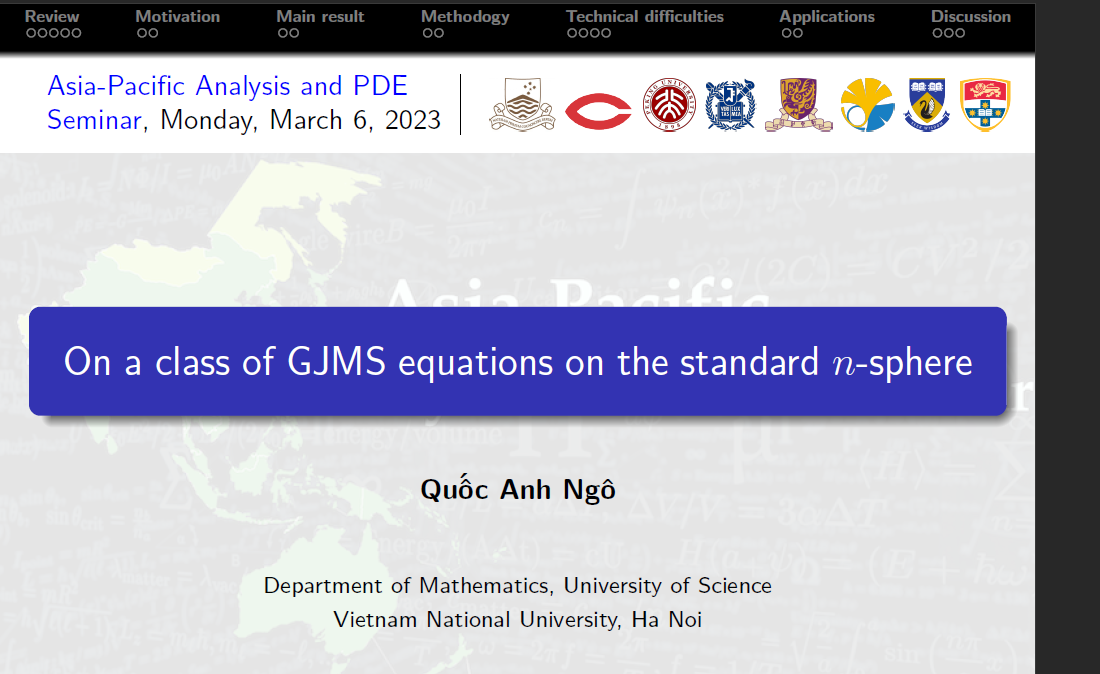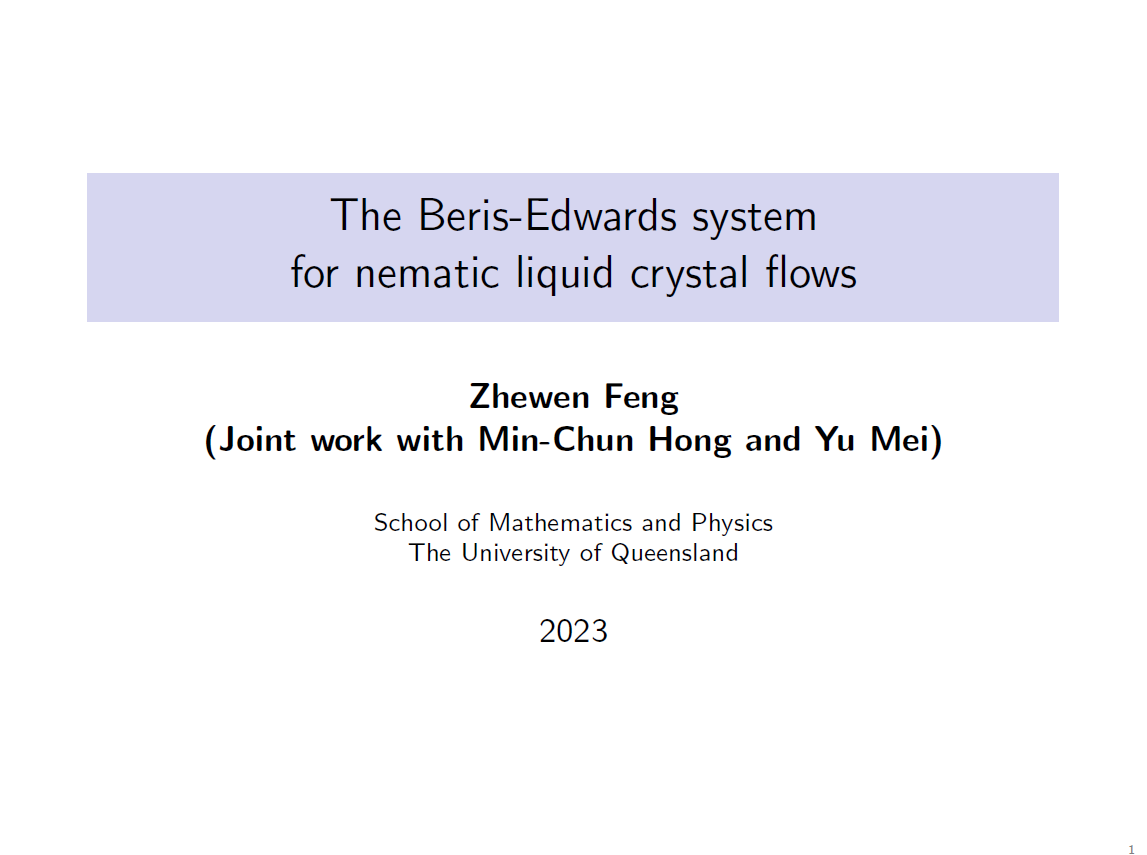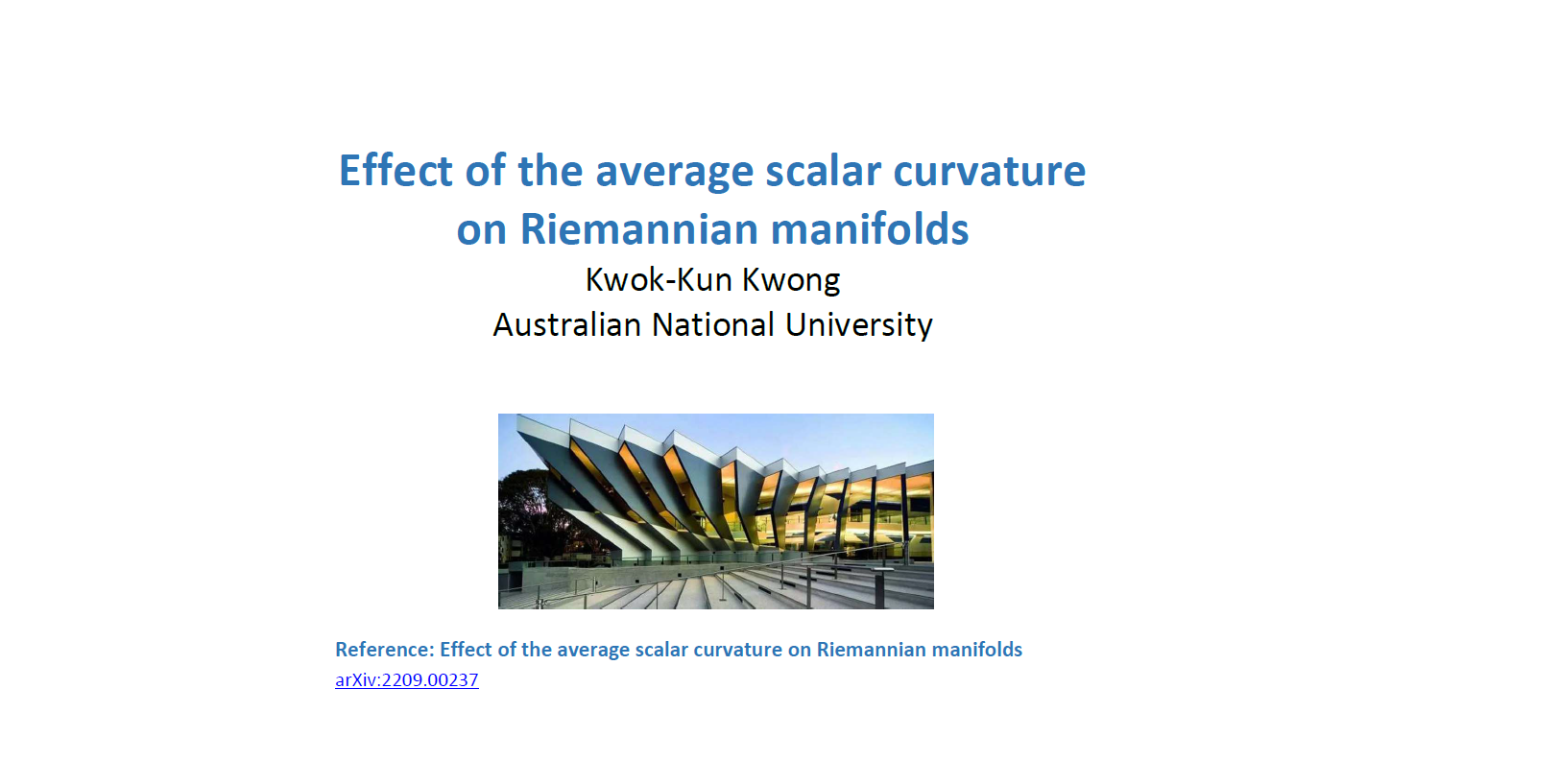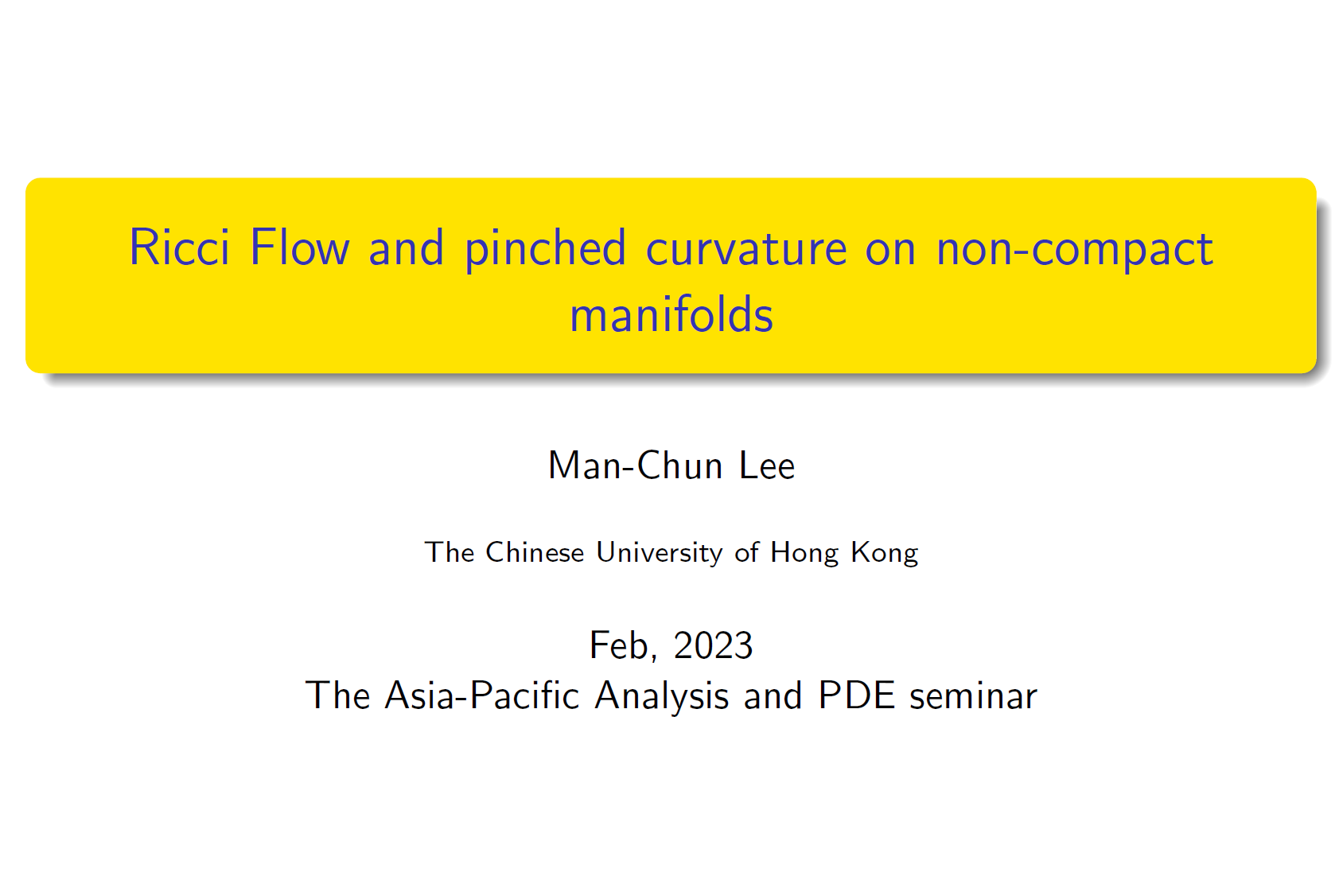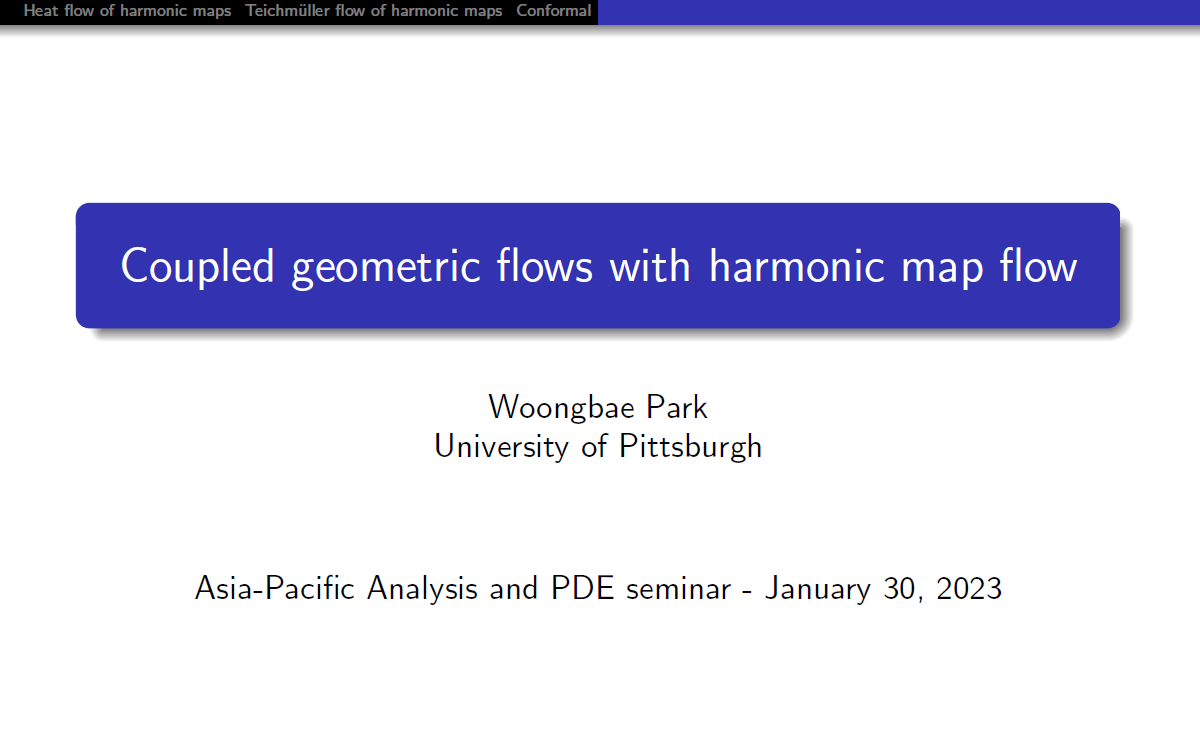Talks in 2023
- Neal Bez, A Nonlinear Brascamp-Lieb inequality, Monday, 26 June 2023.
- Zhewen Feng, The Beris-Edwards system for nematic liquid crystal flows , Monday, 27 February 2023.
- Naoya Hatano, Endpoint estimates for commutators with respect to the fractional integral operators on Orlicz-Morrey spaces , Monday, 27 March 2023.
- Daniel Hauer, An extension problem for the logarithmic Laplacian, Monday, 18 December 2023.
- Dohyun Kwon, Level-set forced mean curvature flow with the Neumann boundary condition, Monday, 13 March 2023.
- Kwok-Kun Kwong, Effect of the average scalar curvature on Riemannian manifolds , Monday, 13 February 2023.
- Man-Chun Lee, Ricci Flow and pinched curvature on non-compact manifolds , Monday, 6 February 2023.
- Congming Li, Classifications of solutions to some nonlinear PDEs of elliptic type and their applications, Monday, 15 May 2023.
- Masashi Misawa, Concentration phenomenon for the Sobolev flow , Monday, 27 November 2023.
- Quoc Anh Ngo, On a class of GJMS equations on the standard n-sphere , Monday, 6 March 2023.
- Woongbae Park, Coupled geometric flows with harmonic map flow, Monday, 30 January 2023.
- Jack Thompson, On an overdetermined problem involving the fractional Laplacian, Monday, 8 May 2023.
- Shuntaro Tsubouchi, Continuity of a spatial derivative for a perturbed one-Laplace equation , Monday, 22 May 2023.
- Jörn Wichmann, Temporal regularity of power-law fluids under stochastic perturbations, Monday, 29 May 2023.
See also the Talks in 2022 page, the Talks in 2021 page and the Talks in 2020 page.

Senior Lecturer @Sydney University, Australia.
Dr Hauer received his doctoral degree in Dec. 2012 in a cotutelle procedure from the University of Lorraine, at Metz in France, and Ulm University in Germany. In Feb. 2013 he started a post-doctoral position at the University of Sydney under the leadership of Professor E.N. Dancer. In 2017, he was promoted to Senior Lecturer at the University of Sydney, and until today, his research in Analyis and PDEs was supported by two discovery projects of the Australian Research Council. Slides to the talk |
An extension problem for the logarithmic Laplacian
Motivated by the fact that for positive s tending to zero the fractional Laplacian converges to the identity and for s tending to 1 to the local Laplacian, Chen and Weth [Comm. PDE 44 (11), 2019] introduced the logarithmic Laplacian as the first variation of the fractional Laplacian at s=0. In particular, they showed that the logarithmic Laplacian admits an integral representation and can, alternatively, be defined via the Fourier-transform with a logarithmic symbol. The logarithmic Laplacian turned out to be an important tool in various mathematical problems; for instance, to determine the asymptotic behavior as the order s tends to zero of the eigenvalues of the fractional Laplacian equipped with Dirichlet boundary conditions (see, e.g., [Feulefack, Jarohs, Weth, J. Fourier Anal. Appl. 28(2), no. 18, 2022]), in the study of the logarithmic Sobolev inequality on the unit sphere [Frank, K\”onig, Tang, Adv. Math. 375, 2020], or in the geometric context of the 0-fractional perimeter, see [De Luca, Novaga, Ponsiglione, ANN SCUOLA NORM-SCI 22(4), 2021]. Caffarelli and Silvestre [Comm. Part. Diff. Eq. 32(7-9), (2007)] showed that for every sufficiently regular $u$, the values of the fractional Laplacian at $u$ can be obtained by the co-normal derivative of an s-harmonic function $w_u$ on the half-space (by adding one more space dimension) with Dirichlet boundary data $u$. This extensionproblem represents the important link between an integro-differential operator (the nonlocal fractional Laplacian) and a local 2nd-order differential operator. This property has been used frequently in the past in many problems governed by the fractional Laplacian. In this talk, I will present an extension problem for the logarithmic Laplacian, which shows that this nonlocal integro-differential operator can be linked with a local Poisson problem on the (upper) half-space, or alternatively (after reflection) in a space of one more dimension. As an application of this extension property, I show that the logarithmic Laplacian admits a unique continuous property. The results presented here were obtained in joint work with Huyuan Chen (Jiangxi Normal University, China \& The University of Sydney, Australia) and Tobias Weth (Goethe-Universit\”at Frankfurt, Germany) See the video of the talk
on our YouTube Channel.
|
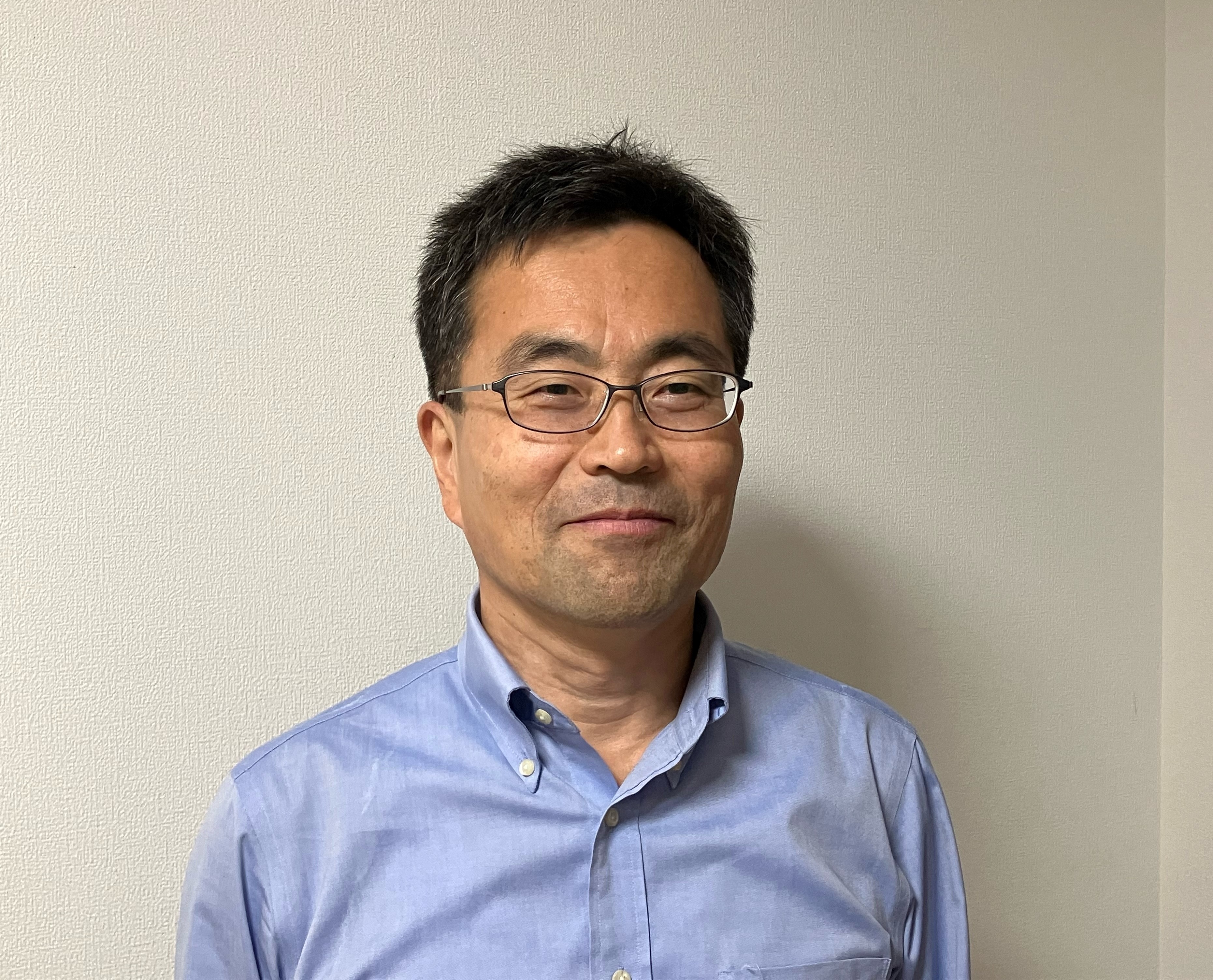
Professor @Kumamoto University, Japan.
Professor Misawa received his PhD in March 1995 from Keio University. He currently holds the Grant-in-Aid for Scientific Research (Kekenhi).n Slides to the talk |
Concentration phenomenon for the Sobolev flow
We shall study the asymptotic behavior at infinite-time of the Sobolev flow. The Sobolev flow describes the gradient flow associated with the Sobolev inequality and is given as a doubly nonlinear parabolic equation. We present the global existence for Cauchy-Dirichlet problem for the Sobolev flow, a boundedness, a positivity and a regularity of the solution. The behavior at infinity-time of the Sobolev flow is studied using the local boundedness of the solution. The local boundedness is the new ingredient obtained for the doubly nonlinear parabolic equation. The concentration phenomenon of volume and energy at infinite-time is shown by the local boundedness. See the video of the talk
on our YouTube Channel.
|
|
Professor @Saitama University, Japan.
Neal obtained his PhD in 2007 from the University of Edinburgh under the supervision of Jim Wright. After positions at the University of Birmingham and the University of Glasgow, he moved to Japan in 2014 and since then has been working in the Department of Mathematics at Saitama University. From the Mathematical Society of Japan, he received a Takebe Katahiro Prize (2014), the Journal of the Mathematical Society of Japan Outstanding Paper Prize (2018), and the Spring Prize (2022). He also received a Young Scientists Prize from the Ministry of Education, Culture, Sports, Science and Technology (MEXT) in 2020. Slides to the talk |
A Nonlinear Brascamp-Lieb inequality
The classical version of the Brascamp-Lieb inequality is a unification of fundamental inequalities such as the multilinear Holder, Young convolution and Loomis-Whitney inequalities. The well-advanced theory for this inequality includes Lieb's theorem which reveals a special role played by gaussians. In 2005, Bennett, Carbery and Wright obtained a nonlinear (local) version of the Loomis-Whitney inequality in which the underlying projection mappings are replaced by nonlinear perturbations. Here we present some joint work with Jon Bennett, Stefan Buschenhenke, Michael Cowling and Taryn Flock in which we provide a nonlinear version of the Brascamp-Lieb inequality in full generality. Our proof is built upon a tight induction-on-scales argument incorporating gaussian near- extremisers. A significant component of our proof is deriving an effective version of Lieb's theorem which guarantees the existence of gaussian near-extremisers with suitable control on their eccentricity. See the video of the talk
on our YouTube Channel.
|
|
Postdoctoral Research Fellow @ School of Mathematical Sciences at Monash University.
Dr. Jörn Wichmann works in the School of Mathematical Sciences at Monash University as a postdoctoral Research Fellow. Before joining Monash University, he did his undergraduate and PhD studies at the University of Bielefeld, Germany. He obtained his PhD in 2022 under the supervision of Prof. Martina Hofmanova and Prof. Lars Diening. In March 2023 he joined Prof. Jerome Droniou and Dr. Ngan Le at Monash University to work on regularity and numerics for non-Newtonian fluids. His main area of interest lies in the design and analysis of numerical methods for the approximation of stochastic nonlinear partial differential equations. Slides to the talk |
Temporal regularity of power-law fluids under stochastic perturbations
Humans have always been interested in fluids. However, many interesting aspects have not been understood yet. In this talk we focus on regularity results for power-law fluids in the regime of laminar flow. These are modelled by the $p$-Stokes system. Already in the absence of turbulence, additional difficulties arise through the non-linear structure of the system as well as the low regularity of the stochastic perturbation. We will elaborate on the difficulties and try to build up an intuition on what regularity is natural. Finally, we present the temporal regularity results and give an application of the natural regularity within the development of numerical algorithms. See the video of the talk
on our YouTube Channel.
|
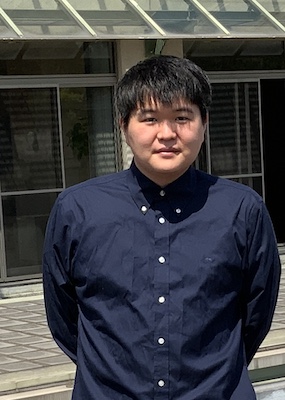
PhD candidate @ University of Tokyo, Japan.
Shuntaro Tsubouchi is a Ph.D. candidate in the Graduate School of Mathematical Sciences at the University of Tokyo. He received a master's degree in 2021 under the supervision of Professor Yoshikazu Giga at the University of Tokyo, and is currently supervised by Professor Kazuhiro Ishige at the University of Tokyo. His research interests are in regularity theory for anisotropic elliptic/parabolic PDE, and in particular, he is currently studying continuity of spatial gradients for some very singular problems involving a one-Laplace-type operator. Slides to the talk |
Continuity of a spatial derivative for a perturbed one-Laplace equation
This talk is concerned with continuity of a spatial derivative for a weak solution to a one-Laplace elliptic equation perturbed by the $p$-Laplace operator with $p\in(1,\,\infty)$. The main difficulty herein is that the one-Laplace operator has both singular and degenerate ellipticity. Due to this anisotropic diffusivity, the equation becomes no longer uniformly elliptic near a facet, the place where a gradient degenerates.Since the one-Laplace operator seems difficult to handle in existing regularity theory, continuity of a spatial gradient has been a long-standing open problem. Recently, the lecturer, inspired by a regularity result on a very degenerate elliptic problem, has found it possible to prove continuous differentiability of a weak solution. The aim of this talk is to explain how continuity of a spatial gradient is shown. See the video of the talk
on our YouTube Channel.
|
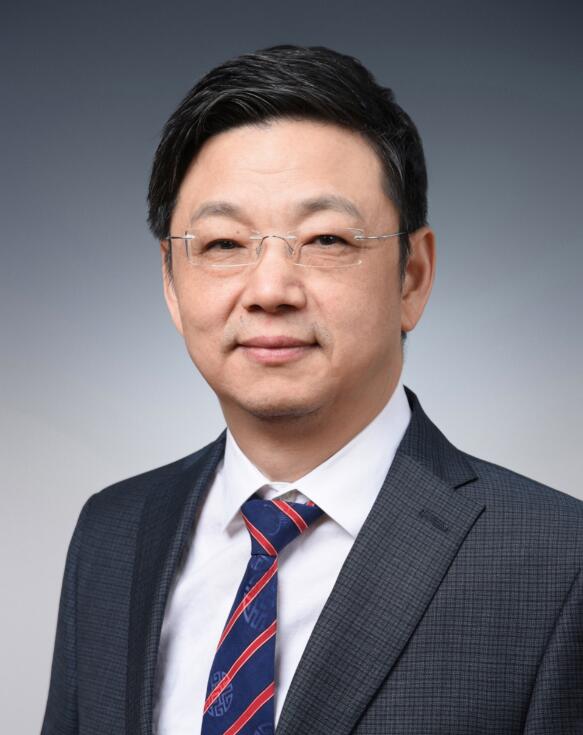
Chair Professor @ School of Mathematical Sciences and CMA-Shanghai, Shanghai Jiaotong University in China.
Professor Li received his PhD. In 1989 from the Courant Institute, New York University, where he studied under the supervision of Professor Louis Nirenberg. He is Chair Professor of Shanghai Jiaotong University, member of the Eighth Disciplinary Review Group of the State Council, and fellow of the American Mathematical Society. In the analysis of geometry and partial differential equations, he studied with his collaborators: the stability of the solution of the three-dimensional Navier-Stokes equation, the symmetry and classification of the solution of some curvature equations, the prior estimation of the solution of the curvature equation with changing sign, and the moving plane in the integral form law. He has publications in the Annals of Mathematics, Invent. Math, CPAM, PNAS and other prestigious academic journals. Slides to the talk |
Classifications of solutions to some nonlinear PDEs of elliptic type and their applications
We present some works on various types of maximum principles, Liouville type theorems, classification of solutions. These are interesting problems in PDE analysis with many applications. We give a brief introduction on the problems, the related methods, and some results with applications. We focus on Hardy-Littlewood-Sobolev system and curvatures related geometric equations as examples to illustrate the ideas, methods and possible applications. See the video of the talk
on our YouTube Channel.
|
|
Ph.D. Candidate @ University of Western Australia.
Jack is PhD candidate in the Department of Mathematics and Statistics at the University of Western Australia, supervised by Enrico Valdinoci, Serena Dipierro, and Lyle Noakes. My research interests are in elliptic/parabolic partial differential equations, particularly in integro-differential equations. Currently, he is working on projects in nonlocal overdetermined problems and regularity theory for nonlocal elliptic PDE.. Slides to the talk |
On an overdetermined problem involving the fractional Laplacian
Overdetermined problems are a type of boundary value problem where `too many' conditions are imposed on the solution. In general, such a problem is ill-posed, so the main objective is to classify sets in which the problem is well-posed. A classical result due to J. Serrin says that a bounded domain in $\mathbb R^n$ that admits a function with constant Laplacian, zero Dirichlet data, and constant Neumann data must be a ball. We consider a semi-linear generalisation of Serrin's problem driven by the fractional Laplacian where the value of the solution is prescribed on surface parallel to the boundary. We prove that the existence of a non-negative solution forces the region to be a ball. We also discuss some further related results. This is joint work with S. Dipierro, G. Poggesi, and E. Valdinoci. See the video of the talk
on our YouTube Channel.
|
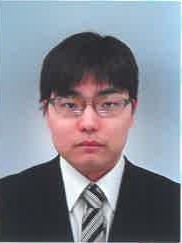
Ph.D. student @ Chuo University, Japan.
Naoya Hatano is currently a Ph.D. student at Chuo University under the supervision of Professor Yoshihiro Sawano. He defended his PhD degree from Chuo University in 2022. He has experience of being a researcher at Center for Advanced Intelligence Project, RIKEN. Slides to the talk |
Endpoint estimates for commutators with respect to the fractional integral operators on Orlicz-Morrey spaces
In this talk, we consider the boundedness of commutators generated by the fractional integral operator on Morrey spaces for the endpoint situations of parameters. Since the commutators do not satisfy the weak-(1,1) boundedness, Cruz-Uribe and Fiorenza gave the modular weak-type inequality on the Orlicz space \$L\log L({\mathbb R}^n)$. Therefore, we introduce its generalization using the Orlicz-Morrey spaces of the second kind. See the video of the talk
on our YouTube Channel.
|
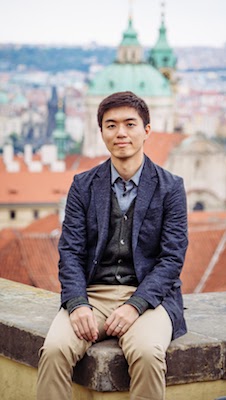
Assistant Professor @ University of Seoul, Republic of Korea.
Professor Kwon received his PhD from University of California, Los Angeles, United States. From 2013-2016, he worked as a researcher @ the National Institute for Mathematical Sciences, Republic of Korea. Since August 2020, he is Van Vleck Visiting Assistant Professor @ Department of Mathematics, University of Wisconsin-Madison, United States and since 2023, Assistant Professor @ University of Seoul, Republic of Korea. Slides to the talk |
Level-set forced mean curvature flow with the Neumann boundary condition
We investigate a level-set forced mean curvature flow with homogeneous Neumann boundary conditions. The well-posedness and the comparison principle of this flow have been well-established in the theory of viscosity solutions. However, our objective is to go beyond the well-posedness theory and gain insight into the long-term behavior of the solution. We begin by demonstrating that the solution is Lipschitz in time and locally Lipschitz in space. Furthermore, by introducing an additional condition on the forcing term, we prove that the solution is globally Lipschitz. Leveraging this result, we obtain the large-time behavior of the solution in this context. This talk is based on joint work with Hung Tran (UW-Madison), Hiroyoshi Mitake(University of Tokyo), and Jiwoong Jang (UW-Madison). See the video of the talk
on our YouTube Channel.
|
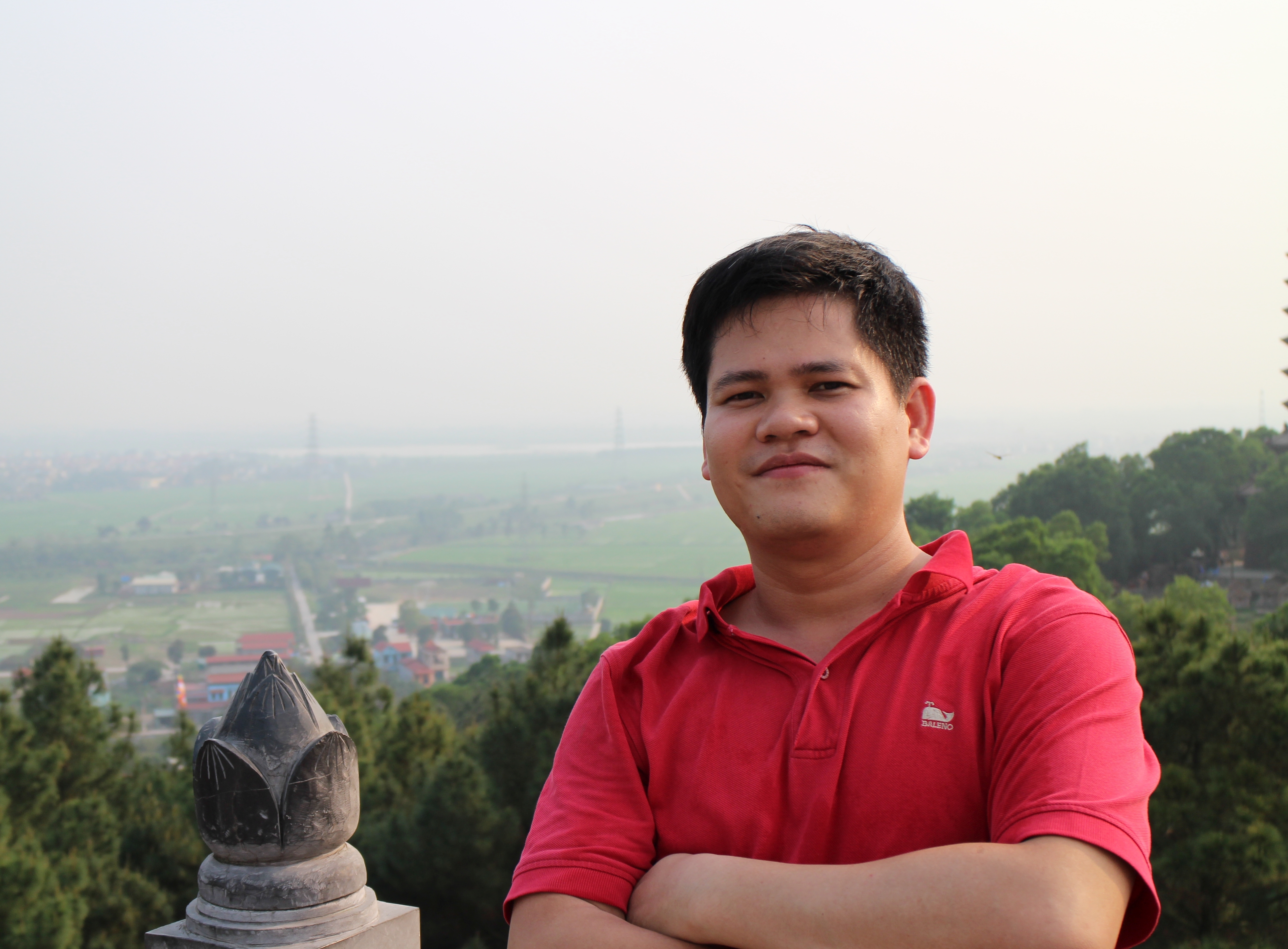
Associate Professor @ Vietnam National University in Hanoi.
Mr. Quoc Anh Ngo obtained his Ph.D. from the National University of Singapore in 2013, under the supervision of Professor Xingwang Xu. After graduation, he held a postdoctoral position at the Université de Tours and a research fellowship at the National University of Singapore. He was also an ICTP Associate at the International Centre for Theoretical Physics from 2015 to 2020. Between 2019 and 2020, he was appointed Project Researcher position at The University of Tokyo. The research interest of Mr. Ngo includes geometric analysis and partial differential equations with applications to mathematical physics and applied sciences. His contributions in these fields have been recognized by the Tosio Kato Fellowship awarded in 2018. He is currently an associate professor at Vietnam National University in Hanoi. Slides to the talk |
On a class of GJMS equations on the standard \(n\)-sphere
In a recent work by F. Hang and P. Yang (Int. Math. Res. Not. IMRN, 2020), a linear perturbation approach was used to tackle the sharp Sobolev inequality for the Paneitz operator on the standard 3-sphere \(S^3\). This route leads to a class of linearly perturbed critical Paneitz equations of order 4 on \(S^3\). From the geometric point of view, the nonlinearity of these fourth order equations contains a negative exponent which costs some analytical difficulty. As a result and supported by much evidence, it was conjectured by them if positive smooth solutions to these fourth order equations are nothing but constant if the perturbation is sufficiently small in an appropriate sense. In this talk, based on joint work with Ali Hyder, I will introduce new ingredients to tackle the above conjecture in a more general framework. More precisely, we are interested in linearly perturbed critical/subcritical GJMS equations of order \(2m\) on \(S^n\) with \(n\lt 2m\). The main finding indicates that if the perturbation is sufficiently small, then any positive smooth solution to these higher-order equations must be constant. In particular, this provides an affirmative answer to the conjecture. Comments on the case \(n\gt 2m\) are also made if time permits. See the video of the talk
on our YouTube Channel.
|
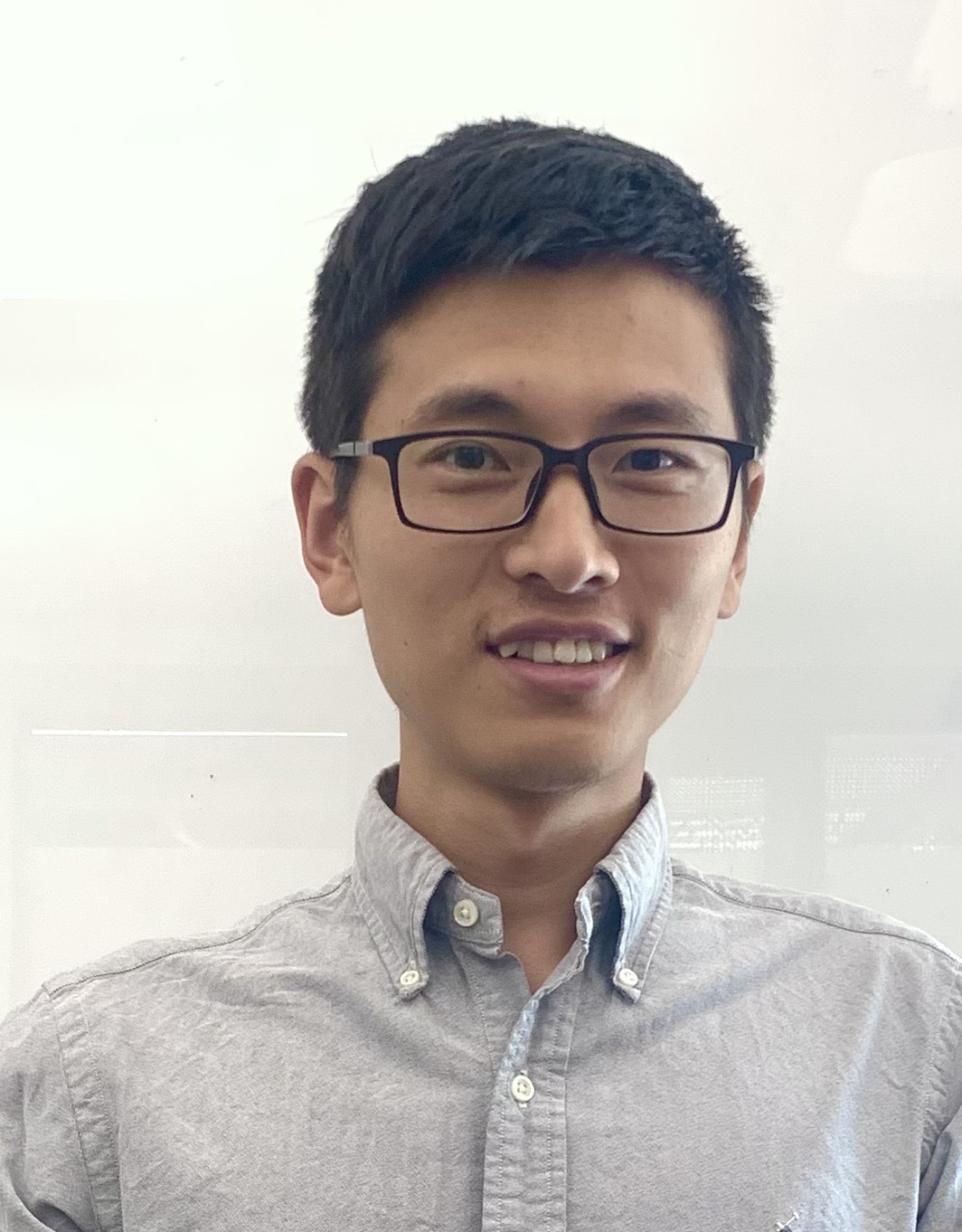
Postdoc Research Fellow @ University of Queensland, Australia
Zhewen Feng received his PhD in Mathematics at the University of Queensland in June 2021 under the supervision of Professor Min-Chun Hong. Since then, he has been a Postdoc Research Fellow at the University of Queensland. Slides to the talk |
The Beris-Edwards system for nematic liquid crystal flows
The Landau-de Gennes theory is the most general continuum theory for nematic liquid crystals. However, Ball and Majumdar (Mol. Cryst. Liq. Cryst., '10) found an example that the original Landau-de Gennes energy functional is unbounded from below; thus, there is no global energy minimizer. In this talk, we consider a new Landau-de Gennes energy functional proposed by F. and Hong (CVPDE '22) that the new energy is bounded from below. Furthermore, we shall present our recent work in collaboration with Min-Chun Hong and Yu Mei on the existence of solutions for the uniaxial Beris-Edwards system based on the new energy with a scaling analysis. See the video of the talk
on our YouTube Channel.
|
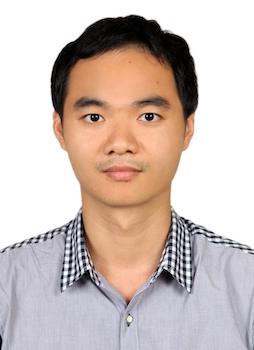
Research Fellow @ the Australian National University in Canberra
Prof. Kwok-Kun obtained his PhD from The Chinese University of Hong Kong in 2011, under the supervision of Professor Luen-Fai Tam. His research interests include differential geometry, Riemannian and Lorentzian geometry, and mathematical relativity. He is currently a Research Fellow at Australian National University. Before coming to ANU, he has worked at University of Miami, National Cheng Kung University, University of Sydney and University of Wollongong. Slides to the talk |
Effect of the average scalar curvature on Riemannian manifolds
The well-known Bishop-Gromov volume comparison theorem says that if the Ricci curvature is bounded below by (n-1)k, then the volume of a metric ball is at most that of the volume of the ball with the same radius in the space form with curvature k. Counterexamples show that the Ricci curvature cannot be replaced by the scalar curvature in the assumption. On the other hand, a Taylor series computation shows that the scalar curvature does tend to decrease the volume of small geodesic balls. In this talk, I will illustrate how the average scalar curvature (together with the Ricci curvature) of a closed manifold affects the average volume of its metric balls of any size. This gives an improvement of the Bishop-Gromov estimate. I will also show its effect on the average total mean curvature of geodesic spheres of radius up to the injectivity radius. See the video of the talk
on our YouTube Channel.
|
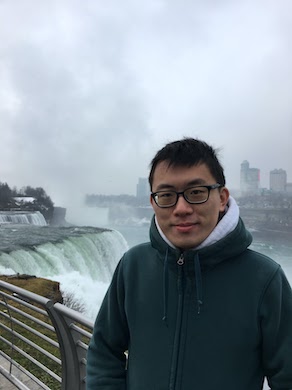
Assistant Professor @ The Chinese University of Hong Kong, Hong-Kong
Prof. Man-Chun Lee received his Phd in 2018 at The Chineses University of Hong Kong under the supervision of Professor Luen-Fei Tam. After graduation, he had worked as Boas Assistant Professor at Northwestern University and Research Fellow at Warwick University. From 2021, he return back to The Chinese University of Hong Kong as a Assistant professor. His research interests mainly focus on complex geometry, geometric flow and compactness in geometry. His contributions in geometric research have been recognised by China's Excellent Young Scientists Fund 2022. Slides to the talk |
Ricci Flow and pinched curvature on non-compact manifolds
In this talk, Lee will discuss some recent development of Ricci flows on non-compact manifolds with unbounded curvature. In particular, Lee will focus on the existence theory of Ricci Flow on manifolds with non-negatively pinched curvature and its applications on Gap theorem. See the video of the talk
on our YouTube Channel.
|
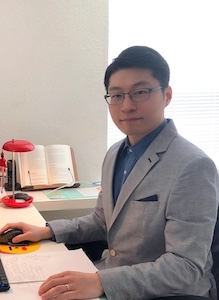
Postdoctoral fellow @ University of Pittsburgh, United States
Dr Woongbae Park received his PhD from Michigan State University. Slides to the talk |
Coupled geometric flows with harmonic map flow
In this talk, Dr. Park will present geometric flows coupled with harmonic map flow. By its importance in geometry, harmonic map flow has been studied widely. But only with appropriate assumptions it enjoys globally smooth behaviors. There are several trials to overcome such so-called "bubbling" phenomenon. Dr. Park will present some of them briefly, including Teichmuller flow, conformal heat flow and harmonic-Ricci flow and their known-results.. See the video of the talk
on our YouTube Channel.
|


